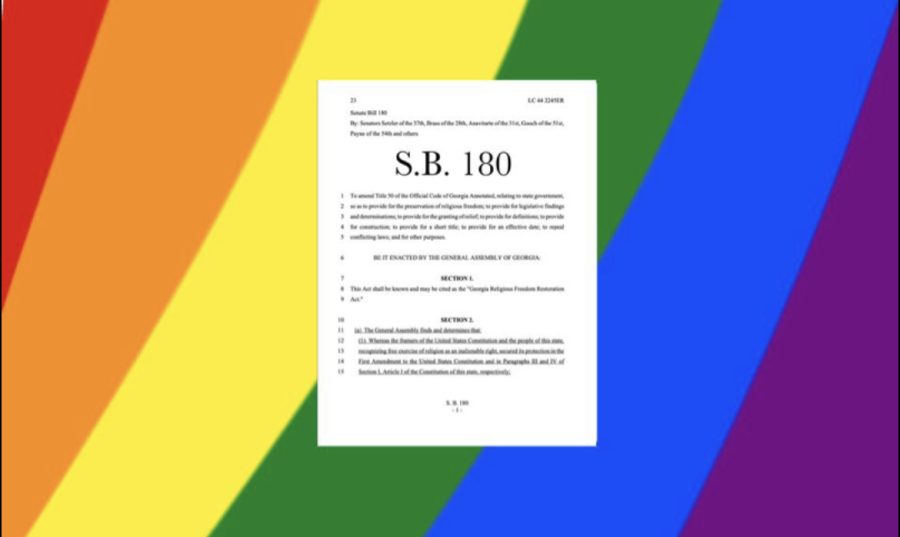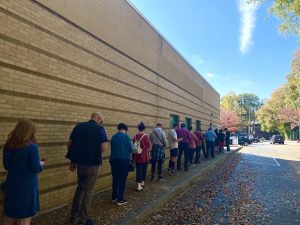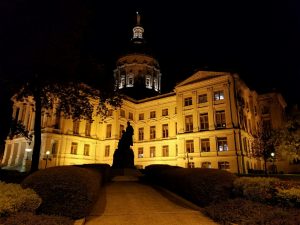Religious Liberty Bill threatens LGBTQ rights
Senate Bill 180 states that the state and local governments wouldn’t be permitted to burden an individual’s free exercise of religion unless the government could demonstrate it had a compelling governmental interest in doing so and that it was using the least restrictive means of intrusion.
March 23, 2023
The Georgia Senate filed a bill calling for greater protections for religious Georgia residents on Feb. 14, but LGBTQ rights advocates argue that the legislation could be used to justify discrimination.
Senate Bill 180, named the Religious Liberty Bill, was initiated by Republican State Senator Ed Setzler with the goal of limiting the state government’s ability to pass or enforce laws that conflict with religious beliefs.
The bill includes provisions stating religious officials are not required to perform marriage ceremonies, perform rites or administer sacraments in violation of their legal right to free exercise. Additionally, it claims no individual is required to attend the officiation of a marriage in violation of their legal right to free exercise of religion. The bill also says faith-based organizations are not required to hire certain employees for the preservation of religious freedom.
“Twenty-four GOP (Republican) Senators were signers [of] the bill, and there are a total of 33 GOP Senators in the Senate,” Senator Nan Ornock said. “Senate bills must be passed by March 6 in order to be considered by the House for passage in this session which ends March 26, so I don’t expect the bill will pass.”
Ornock was elected to the Georgia House of Representatives in 1986 where she served 10 terms and was the first woman elected to serve as the House Majority Whip. Ornock was elected to Senate District 36 in 2006 and has served 17 years representing parts of Fulton County and the cities of College Park, East Point and Hapeville. She believes the bill is similar to bills that have previously been introduced by right-wing representatives and was created to negatively impact the LGBTQ community.
“[The bill] allows someone to refuse filling prescriptions or medical services if a person claims that doing so would violate their religious beliefs,” Ornock said. “SB180 is a significant attack on the LGBTQ community and is introduced and supported with that in mind. Legislators that sign it can check the box that they are protecting religion, and that they are pushing back against full democratic rights for LGBTQ community members.”
Midtown parent and member of the LGBTQ community Leslie Cohen is the owner of the local business Firepit Pizza. She says that even without legislation permitting it, discrimination has, and will continue to, occur in the workplace.
“Firepit is an LGBTQ-owned restaurant, so we try to encourage diversity and have created a welcoming environment for everyone,” Cohen said. “But yes, there’s definitely discrimination in the restaurant industry, and the beauty is employees having laws to protect them. It keeps us, owners, held accountable. I think there’s going to be discrimination in any workplace, and I think we’ve got to fight for those laws. Especially if the law is on our side, it’s so easy for employers to do what they want to do. Workers should hold the cards.”
Ornock says that while Senate Bill 180 may appear to provide more power to employers by providing additional leeway as to who they can hire, it is the business community that has shown a significant amount of disapproval towards the legislation.
“It’s important to know that in the past when this type of bill has been introduced in Georgia, there has been significant opposition from the business community whose spokespeople have described the bill as divisive, bad for the state’s image and likely to send negative signals about Georgia to the rest of the nation,” Ornock said. “That viewpoint is accurate, and the business community typically has considerable influence on legislators and state leaders.”
Commonly referred to as ‘a blue bubble,’ Atlanta has an abundance of left-wing voters compared to the rest of Georgia. Midtown parent and partner of Cohen, Nikki Bachrach, feels that although Atlanta serves as a diverse space filled with progressive ideas, legislators fail to represent that.
“I grew up in a very small, very conservative country town, and I wanted to raise my kids in a place that was diverse so they could learn a different way of life than I did growing up,” Bachrach said. “They would have different perspectives on things that I did and I’ve been proud of raising them here but it’s very scary to see these kinds of things going in the wrong direction.”
Cohen agrees that the proposed legislation reflects the beliefs of areas outside of the city, and not those within the perimeter.
“I have been in the blue bubble my whole life, but as you get further out in areas that just may not have as much education about the LGBTQ community, you can see that,” Cohen said. “It’s just not a talked about subject, so they just don’t know about it.”
While the bill has not yet been passed, Ornock believes discrimination against the LGBTQ community will be protested due to Georgia’s high political engagement.
“Since SB180 has not moved forward, I have not heard a great deal from concerned advocates, but in past years when similar bills have been introduced or attempted as amendments to add to other bills, there has been significant activity to oppose these measures,” Ornock said. “I encourage concerned young people as well as those of any age, to always call, email, write or visit legislatures to voice opposition to this and other right-wing measures.”
The bill includes provisions that have previously been brought forward by Georgia legislators which brings junior and President of the Midtown Votes Club Imani Johnson to question whether the legislation if passed, will truly change anything.
“People aren’t going to stop living their lives,” Johnson said. “People aren’t going to stop getting married, people aren’t going to stop having different religions. And people aren’t going to stop showcasing what they believe in. People need to stop trying to rip away amendments just because they don’t agree with something that’s said or done in the world around them. The only person that you have to worry about is yourself.”
Johnson encourages her peers to increase their political involvement, as she feels it is the only way young people can have a voice in politics past voting.
“If teenagers really feel a certain way about [a political decision] and feel animosity towards it, then do something about it,” Johnson said. “Stop waiting [until] the last minute to register to vote; stop waiting until the last minute to tell your family that they need to vote; stop sitting behind a computer and posting graphics about why something sucks. Go donate your time.”
Ornock is glad to see that students have continued to take interest in battles for social progress.
“We need the voices and activism of the youth that can make a powerful difference in moving society forward, particularly in these times when we see full-blown threats to democracy on the rise,” Ornock said. “I was in the generation that rallied in the sixties to push forward, against discrimination, for equality and a fuller democracy. Standing up, getting involved and speaking out can indeed change the nation and the world as history has shown time and time again.”










